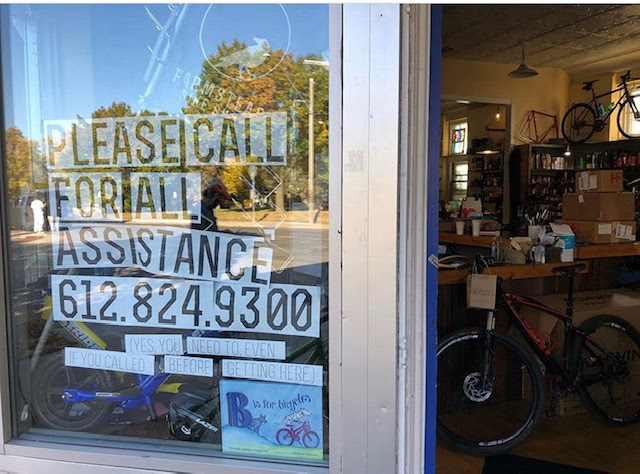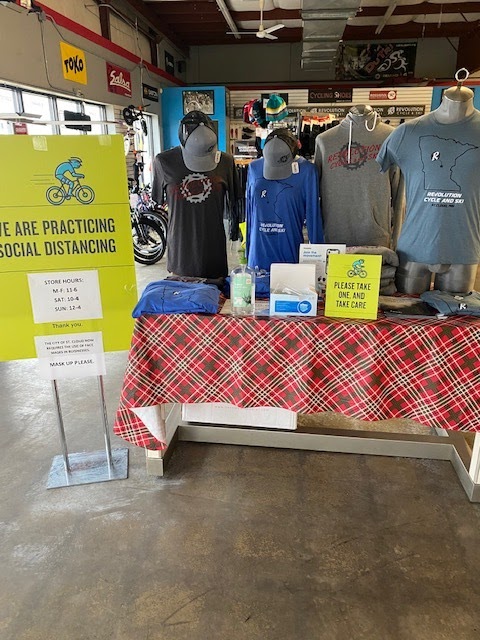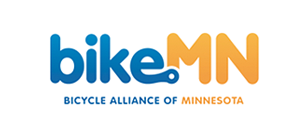In March of this year, life seemingly shut down in an instant in response to COVID-19. As Spring wore on, Minnesota slowly reopened. Businesses deemed “essential” to everyday life continued operating, from doctors’ offices to grocery stores.
Through the hard work of BikeMN’s executive director Dorian Grilley, and a few other key individuals, bike shops and manufacturers throughout the state were categorized as “essential” and tasked with re-opening amid a global pandemic. BikeMN caught up with two shops to talk about their experiences, and what it meant for them to remain open, these past few months.
Outdoor Motion in Hutchinson, Minnesota was already poised for an unusual and potentially difficult season. The main way to access the shop, Highway 15, was closed for construction all summer. Chad Czmowski has owned and operated Outdoor Motion for seventeen years.
“I was really nervous about the whole year,” Czmowski said. “We cut our hours back initially because we thought business was going to be slow because of the highway shutdown.”
Admittedly, Czmowski questioned whether a little bike shop in rural Minnesota was really an essential business. He quickly came around to the idea, though.
“Especially out in the country, a higher percentage of our customers are recreational in nature, whereas if you’re in the metro people depend on their bikes for transportation more,” Czmowski explained. “As everyone else was shut down, there were three customers that came in that did depend on their bikes for transportation. They would’ve been screwed if I’d have been closed for four months. They’d have no option.”
2020 saw one of the largest increases in biking in recent years. The snow melted and it got a little warmer, but people still couldn’t go anywhere. People quickly turned to their bikes to get outside and get active.
Across the state, statistics show that biking and walking were up 71% in mid-March compared to the year before. In Minneapolis, pedestrian and bicycle traffic on the popular West River Parkway was 144% higher than the daily average from 2017 through 2019.
“Within the first month or so after the shutdown, it became obvious that everyone in our neighborhood had determined that life was going to be radically different, but the one thing they needed was their bicycle,” explained Greg Neis, owner of Farmstead Bike Shop in Minneapolis. “Everybody used it as their escape pod, just to get some fresh air and exercise and a little bit of alone time, too.”
The marked increase in biking was reflected in sales, too. Across the country, bicycle sales and service were up, with leisure bike purchase and service leading the way at a 121% increase.
The stimulus check — roughly $1,200 in federal money given to eligible Americans — was only the beginning of the boom for Outdoor Motion. Throughout the spring, their sales skyrocketed and remained high.
“We had our best year ever. It was absolute chaos in here, the whole time,” Czmowski said. “From whenever the shutdown started, until now, it’s just been absolute chaos, which is good.”
“Thankfully, people have been conditioned to need to wait for things before they need bikes — this winter you couldn’t buy toilet paper or paper towels, or hand sanitizer,” Czmowski said. “People had no problem waiting for a bike. We’d get a shipment of 40 bikes and 20 of them were pre-sold and people had no care what color they were or anything. It was just, ‘I need a bike, so give me a bike.’”
Photo provided by Greg Neis of Farmstead Bike Shop.
Outdoor Motion sold everything from higher-end local brands produced by Quality Bike Parts (QBP) to entry-level household names to meet demand.
“Unfortunately, QBP wasn’t able to keep up with demand, so they weren’t able to restock until very late in the year,” Czmowski said. “We did sell a lot of the higher-end stuff. As the entry-level stuff sold out, people just bought whatever price-point we had in.”
Because many bike components are produced abroad, especially in countries like China that felt the earliest effects of the pandemic, finding and purchasing bikes was harder than ever.
“It got to be where people were coming from all over the place to buy stuff because their local shop didn’t have anything,” Czmowski said. “I kind of gambled a bit and ordered a pile of bikes real early in the pandemic, so I did have bikes longer than some local shops did. That was a gamble, but it paid off. We sold 35 percent more bikes than we normally would, which was awesome.”
Farmstead Bike Shop saw similar increases in sales.
“We’re an independent bike shop, so we have access to a lot of brands and a lot of distributors,” Neis said. “For us this year, it was apparent that bike sales were going to be at least as strong as we were used to, maybe stronger. It was also apparent that there were fewer bikes in the world to be sold. We really quickly started looking for additional stock and brought in a few brands that we didn’t have before to fill some gaps.”
Getting the bikes proved to be the easiest part of the pandemic for Farmstead, though. Being in the city, a close-contact environment and where more people use their bike to commute, presented a unique set of challenges.
“Thinking back to spring is kind of amusing,” Neis said. “We were, like everyone else, just trying to figure out how to manage taking care of our staff and distancing and masking. When the shutdown came along, we weren’t sure whether we were going to be open or not.”
Photo provided by Ben Doom from Revolution Cycle
Under Emergency Executive Order 20-20 released on March 27th — the same EO that Dorian helped craft — biking and walking were permitted activities, and bicycle shops and distribution facilities were classified as critical services.
“We took it really seriously right away. I worked in healthcare for many years and actually called an infection control nurse that I know,” Neis said. “It was a rough couple of weeks, to be completely blunt. It took a while for us to get folks to comply with that, but I think that was happening everywhere.”
Even with the transition period, Neis appreciated the sense of community that the shop was able to foster during the pandemic. Farmstead canceled all their group ride events, and their race team was unable to train together. Nonetheless, personal check-ins remained essential.
“As people check-in, we don’t usually talk about mental health with half the people we deal with on a given day, but this year we are,” Neis explained. “Even though all of our social rides were canceled, it’s still a little bit of a community hub. That feels really good too, that’s something we’ve always tried to foster. That’s something that’s strengthened at bike shops all around the country.”
This article was featured in BikeMN’s quarterly newsletter, SHIFT, and may have been altered to better accommodate BikeMN’s blog. Sign up for SHIFT here.
